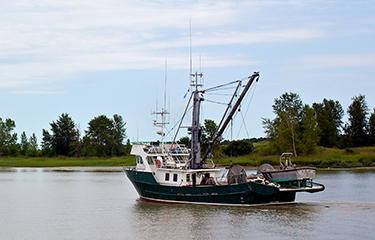British Columbia’s wild salmon industry is facing lower prices and a loss of access to premium export markets with the expiration of Marine Stewardship Council certification for three key species.
The demise of the industry’s ability to use the eco-label began in 2019, when the Canadian Pacific Sustainable Fisheries Society (CPSFS) self-suspended its MSC certification for B.C.’s sockeye, pink, and chum salmon fisheries. The group – which represents nearly 30 local fishing entities – had two years to fulfill a number of conditions to retain certification, but even from the outset, there was little hope of meeting those conditions.
At the time of its self-suspension, the CPSFS said the regional office of Canada's Department of Fisheries and Oceans (DFO) was failing to meet its obligations toward having the fisheries recertified.
During a 2017 MSC reassessment, 22 conditions were identified that would require progress audits. A subsequent audit in 2018 found the fisheries lagging behind in nine of those conditions.
The DFO’s role in the process included stock assessments and an examination of the impact of hatcheries on wild salmon populations, the CPSFS said. CPSFS Secretary-Treasurer Christina Burridge said despite an action plan being set up between the group and the DFO to meet those conditions, the government agency was ultimately “unable to deliver on those commitments.”
MSC suspension was in place for two years before its certifications officially expired in late October.
“As of 27 October, our self-suspension expired and we have not been able to renew the certificate for sockeye, pink, and chum, the three main commercial species in B.C.,” Burridge said.
Without MSC certification, B.C.’s wild-catch salmon industry has voiced concern over losing access to lucrative foreign markets.
Dane Chauvel, the founder and chief executive of B.C.-based Organic Ocean and chair of the B.C. Salmon Marketing Council, said loss of the MSC label will result in lower prices and will make it more difficult to market wild local salmon.
“It closes down some markets to us, because large retailers are looking for that blue logo. If you can’t provide it, they won’t buy your fish regardless of what you say about it. It’s not insignificant,” he said.
Chauvel placed blame for loss of the certification on the DFO’s lack of action.
“The DFO wears this,” he said. “The industry has been leaning on the DFO to do the science and do what’s necessary to maintain the certification. The industry is so broken, it doesn’t have the ability to do this itself.”
In addition to the commercial implications, the DFO's failure on this issue has resulted in mounting concern over the lack of oversight of the DFO’s management of wild salmon fisheries, Chauvel said.
Aaron Hill, executive director of the Vancouver, B.C.-based Watershed Watch Salmon Society, said he also believes the DFO failed to perform its duty. He said the loss of MSC certification will create a vacuum in necessary oversight of the fisheries' management.
“We don’t have a good sustainability indicator to drive things towards sustainable practices,” he said. “That’s sorely needed.”
In 2019, the CPSFS revealed DFO regional directors had sent a letter to senior managers expressing concern that “the regional ability to meet well-established core salmon assessment programs is no longer possible with the allocated funding.”
SeafoodSource reached out to the DFO for clarification of its role in the assessment process. The federal government agency responded but did not provide further details of its role in the failure to produce the progress audits mandated by MSC.
The loss of MSC certification for B.C.'s wild-catch salmon fisheries comes as the DFO has been paying greater attention to B.C.'s salmon aquaculture industry. Canadian Prime Minister Justin Trudeau’s Liberal Party has pushed for a transition away from open net-pen salmon farming by 2025, and in 2020 the DFO – then under the leadership of previous Canadian Minister of Fisheries, Oceans, and the Canadian Coast Guard Bernadette Jordan – made a sudden announcement that all salmon farms in the Discovery Islands in B.C. would be phased out in just 18 months.
That decision has since been delayed by a court ruling, and the DFO’s new Minister, Joyce Murray, has taken a seemingly different tack. In June 2022, the DFO renewed B.C. salmon farm licenses for two years, and now the DFO is no longer pushing a net-pen ban.
Despite the loss of MSC certification, Burridge said she believes the Canada's wild salmon catch remains sustainable and well-managed, and that the CPSFS has kept the door open to having it reevaluated and recertified in the future.
“We still believe that B.C. commercial salmon fisheries are managed in an ultra-conservative way and the few that are allowed are sustainable. However, we cannot demonstrate that in the way the MSC requires,” she said.
In 2021, the federal government announced USD 470 million (EUR 454 million) in funding as part of a five-year plan to restore wild Pacific salmon stocks, including new hatcheries and habitat restoration.
Photo courtesy of Ivan_Sabo/Shutterstock







